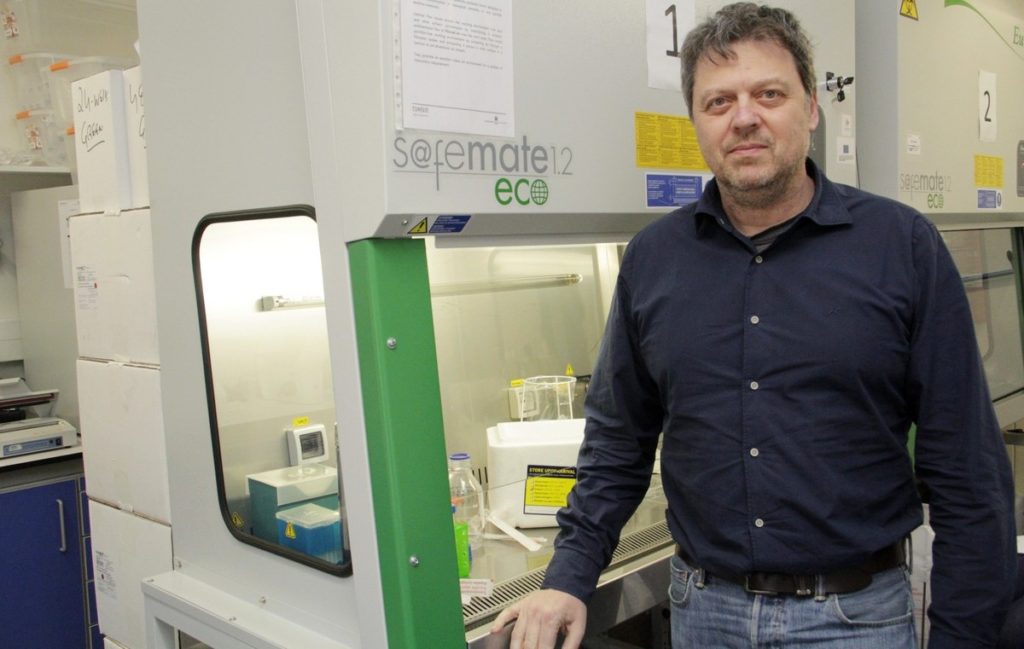Scientist João Mano, from the University of Aveiro (UA), won a grant of 2,5 million euros awarded by the European Research Council (ERC) to work on the regeneration of bone tissue.
This is the second time that João Mano, a specialist in biomaterials, has been awarded the ERC Advanced Grant, one of the most important European exchanges. In this competition, the scientist from Aveiro was the only one in Portugal to receive this type of grant.
The grant will allow, for five years, to develop work in the area of bioengineering of human tissues and advanced biomaterials, namely in the creation of strategies for the regeneration of bone tissue, which could have an impact in cases of massive loss or extensive fractures of bone.
“I feel extremely honored with this extraordinary recognition, and for the support of all the members of the group”, congratulates João Mano, full professor in the Department of Chemistry and researcher at CICECO – Instituto de Materials de Aveiro, one of the research units of the AU.
“With this grant, we see the opportunity to combine high-level basic research with radically innovative therapeutic solutions that could have an impact on the quality of life of patients”, he points out.
One of the great innovations of the project "REBORN: Full human-based multi-scale constructs with jammed regenerative pockets for bone engineering” led by João Mano deals with the use of proteins obtained from tissues collected during childbirth, which are normally disposable, such as the amniotic membrane and the umbilical cord.
These will serve as a basis for the construction of highly hierarchical devices, from the nano to the macro-scale, with a great capacity to generate mineralized bone tissue and promote its vascularization.
Of these perinatal tissues, it will also be possible to remove cells that will play a fundamental role in the construction of tissues in the laboratory. The cells will be introduced into small artificial “placentas” which, by providing adequate biochemical and mechanical signals, will promote the formation of micro-tissues in a completely autonomous way.
The agglomeration of these “regenerative pockets” in a controlled manner in space will allow the development of three-dimensional tissues at the scale of real bone defects, with great geometrical precision.
In addition to applications live, it is anticipated that these innovative devices could also serve as disease models of dimensions and specifications similar to those of real tissues, in order to test new drugs and therapies, and could thus be seen as an alternative to animal testing or clinical testing.
João Mano has internationally recognized work in the field of biomaterials development and proposals for new concepts for biomedical applications, in particular in the area of Regenerative Medicine, and directs one of the most active research groups in Europe in the area of biomaterials and human tissue bioengineering, O COMPASS Research Group.
These individual grants are obtained after participating in extremely competitive competitions, where the evaluation criteria are based solely on scientific excellence.
The evaluation includes the analysis of the researcher's scientific curriculum, which must be at the top of researchers working in Europe, and also the excellence of the project to be carried out, its degree of risk and the radically innovative approach to the frontiers of science adopted in the proposed work.
Even though it received applications from Europe's most eminent scientists, the success rate of grants funded this year was less than 10 percent. This advanced scholarship was the only one, among 185 approved, awarded to a Portuguese researcher or researcher working in Portugal.
A remarkable and rare feat was that this advanced scholarship was the second that João Mano managed to see financed, with the first one still in execution. Additionally, an ERC Proof of Concept Fellowship (ERC-PoC) had already been awarded in 2018.
ERC-PoC grants support activities at the initial stage of transforming results obtained by researchers holding ERC grants into proposals with commercial potential, capable of achieving economic or social benefits.
In addition to this advanced scholarship, in 2019, three scholarships for researchers from the UA CICECO had already been awarded: two consolidation scholarships (Consolidator Grants, ERC-CoG) and another proof-of-concept grant (ERC-PoC).



















Comments